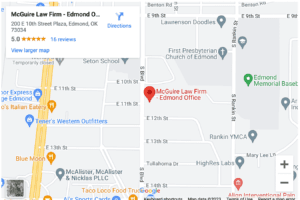Will My Personal Injury Case Go to Trial?

Will your personal injury case go to trial? The short answer to this question is “probably not.” Only a small percentage of personal injury claims make it to trial, even if the victim files a lawsuit. Most cases settle out of court.
Nevertheless, a trial is always possible. It depends on how stubborn each party is, among other factors. If the opposing party (typically an insurance company) refuses to pay or refuses to raise its settlement offer – and if the victim absolutely refuses to accept the insurance company’s settlement offer – then a trial is inevitable.
Filing a Claim With an Insurance Company

Most personal injury claims start as third-party insurance claims. The “third party” is a personal injury victim whose name does not appear on the policy they are claiming against. Suppose, for example, that ABC Insurance Co. sells an insurance policy to John Doe. John Doe gets into a car accident with Mary Roe, who is injured. Mary Roe has an insurance policy with XYZ Insurance Co. Mary Roe then files a third-party claim against John Doe’s liability insurance policy with ABC Insurance Co. Mary Roe is the “third party” in this scenario because she doesn’t have a policy with ABC Insurance Co.
Offer and Counteroffer
The typical process of negotiating a personal injury claim works something like this:
- You issue a specific settlement demand, broken down by category ($80,0000 including $20,000 for medical bills, $10,000 for lost earnings, and $50,000 for pain and suffering, for example).
- The insurance company rejects your claim outright or issues a counteroffer ($25,000, for example). Any initial counteroffer is likely to be utterly inadequate.
- You (or your lawyer) discuss the case with the insurance adjuster, present evidence, and make and reject further offers.
- The insurance company issues you a final, take-it-or-leave-it offer. If you accept the officer, both parties sign a settlement agreement. If not, you can try to appeal the offer through the insurance company’s own appeals system.
- If the appeals process fails to yield an acceptable result, it might be time to file a lawsuit.
However, you could pursue other options as well, such as agreeing to third-party arbitration or mediation.
Filing a Lawsuit
Filing a lawsuit is not the same as going to trial. Although you must file a lawsuit to get a trial, plaintiffs withdraw most lawsuits before trial. You might file a lawsuit for several reasons, including:
- The insurance company’s final offer is insufficient to cover your losses, and you want to use a pending lawsuit as a bargaining chip;
- You want access to the court-supervised “discovery” process for gathering evidence; or
- The statute of limitations deadline is looming, and you need to file a lawsuit to beat the deadline.
Remember, you can still settle a claim even after you file a lawsuit, as long as the court has not yet reached a final verdict. Courts usually wait to schedule trials for weeks or even months after one party initiates the lawsuit by filing a formal written complaint.
The Discovery Process
The discovery process is a way of gathering evidence that might be otherwise unavailable to you. You can only use it after a lawsuit is filed. The discovery process includes:
- Depositions: You can examine and cross-examine witnesses out of court but under oath. You can also subpoena a reluctant witness.
- Interrogatories: You can issue written questions that you can compel the other side to answer.
- Request for the production of documents: You can demand that the defendant produce documents in their possession. You can even demand documents from third parties (banks, for example).
The court has the power to order a reluctant opposing party to cooperate with your discovery efforts. The evidence that you gain that way might just give you the winning edge in settlement negotiations. Remember, however, that the other side can also make the same demands of you.
The Statute of Limitations Deadline
In Oklahoma, the personal injury statute of limitations (the deadline for filing a personal injury lawsuit) is two years after the accident, although certain exceptions apply. In a wrongful death claim, the two-year countdown begins on the date of the victim’s death. If you miss the statute of limitations deadline, your claim will be worthless, even at the settlement table.
Going to Trial: The Pros
- Victim-friendly juries: Some juries are sympathetic to claimants, especially if the defendant is a large corporation. Additionally, Oklahoma allows punitive damages (awarded in addition to ordinary compensatory damages), although it limits the amount to $100,000 or 100% of the amount of compensatory damages, whichever is greater.
- A trial can be a great way to work around the limitations of a stingy defendant or insurance company. You don’t have to secure an agreement if the court can compel a defendant to pay.
- Winning at trial can give you a sense that justice has been done. A trial can also publicly shame a defendant whose behavior was outrageous.
- Winning at trial might set a judicial precedent that will benefit future victims who find themselves in the same situation as you. That might include you if the defendant is someone you must deal with again in the future.
Most victims would prefer to settle their claim out of court despite these advantages.
Going to Trial: The Cons
There are several reasons why so few claims make it to trial. These reasons include:
- Trials typically take longer than negotiated settlements. In extreme cases, a case might take years to resolve.
- Judges typically pressure parties to settle to reduce the size of their bloated dockets. You might think twice about antagonizing a judge who is pressuring you to settle and who will preside over your lawsuit.
- Juries are unpredictable. You might run into a jury that will award you very little or rule against your claim.
- Trials can get expensive. Various expenses in addition to legal fees (investigation expenses, etc.), tend to pile up. Some lawyers charge a higher percentage for a verdict than for a settlement.
Despite these disadvantages, going to trial is sometimes the best option.
Contact a Personal Injury Attorney
Have you suffered a personal injury that might be someone else’s fault? If so, you might have a personal injury claim, and it might be worth far more than you think it is. Many personal injury law firms offer a free consultation, so it won’t hurt your pocket to reach out to an attorney to ask about your case.

